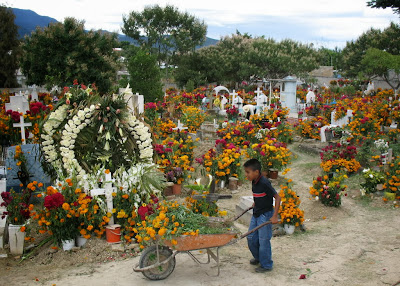My Poetry Friday contribution is at the end of this post (scroll down for it) but first I want to say that I'm writing this on Sunday the 19th and scheduling it to go live (hopefully) on Friday. My husband and I are on our way to Oaxaca on Tuesday the 22nd, which means that by Poetry Friday on the 25th we will be enjoying our breakfasts at the Encanto Jalatlaco (no cell phone, no television, no computer)...
and looking forward to the Day of the Dead celebrations at the end of the month, particularly the visit to the panteon/cemetery...
and watching the comparsas/parades throughout the city, when the skeletons take over....
and visiting the archaeological treasures at Atzompa...
and the paper-making factory at San Agustin Etla Center for the Arts....
In anticipation of our trip, I'll post this poem I wrote about a market I visited with my family in Tepoztlan, Morelos (originally posted on Jama Rattigan's Poetry Potluck Series 4/9/2010. ) Hope you enjoy it:
pork pozole, pumpkin seeds,
chiltepines, round and red,
coconut juice and gold guayavas,
then the different names for bread:
little shell and little piglet,
little ear and little horn,
now a cup of spiced hot chocolate,
sweet tamal with cream and corn,
pineapple popsicles, sugar cane,
guava jelly, caramel flan,
magic powders, hot tisane, :
Market Day in Tepoztlan.
 |
| Fresh fruit, fresh juice, pan dulce, churros.... |
 |
| ...and Oaxacan chocolate! |
and looking forward to the Day of the Dead celebrations at the end of the month, particularly the visit to the panteon/cemetery...
and watching the comparsas/parades throughout the city, when the skeletons take over....
and visiting the archaeological treasures at Atzompa...
and the paper-making factory at San Agustin Etla Center for the Arts....
and visiting the weaving workshops of Teotitlan...
and seeing the green pottery...and the painted alejibres...and...and...as much as we can!
Market Day
Black avocados, yellow mangos,
bowls of menudo to start the day.
Tall, cold glass of fresh horchata,
green papayas, pink mamey,
bowls of menudo to start the day.
Tall, cold glass of fresh horchata,
green papayas, pink mamey,
pork pozole, pumpkin seeds,
chiltepines, round and red,
coconut juice and gold guayavas,
then the different names for bread:
little shell and little piglet,
little ear and little horn,
now a cup of spiced hot chocolate,
sweet tamal with cream and corn,
pineapple popsicles, sugar cane,
guava jelly, caramel flan,
magic powders, hot tisane, :
Market Day in Tepoztlan.
------------------
Poetry Friday is being hosted on the 25th by Irene Latham at Live Your Poem. Head over there for links to what other people have posted. And thanks, Irene!
P.S. Go ahead, please, and leave comments. I might not be able to approve them until I'm home on November 5th - we'll see. Thanks in advance to all who visit!
P.S. Go ahead, please, and leave comments. I might not be able to approve them until I'm home on November 5th - we'll see. Thanks in advance to all who visit!



























